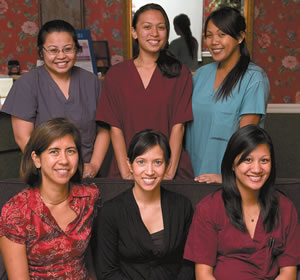Caring For Women’s Health
Interviewed by Midweek Staff
Wednesday - August 19, 2009
E-mail this story | Print this page | Comments (0) | Archive
 Del.icio.us Share
Del.icio.us Share

DR. CHERYL LEIALOHA
OB/GYN
Where did you receive your schooling and training?
I attended Hilo High School. I received my undergraduate B.A. degree in biology at UH-Hilo. Then I went to John A. Burns School of Medicine and later did my residency training here at Kapiolani Medical Center. Then I went into private practice.
How long have you been practicing?
Eleven years.
As one of the OB/GYNs at Hawaii Women’s Healthcare, could you discuss the history of the center and why it was opened?
We started off here at Kapiolani in November 1997, and our office in Waipahu opened in February 1998. We chose Waipahu because it was under-served. When we first went out there, there was just one other female, and it was also a growing population. When I first started - Dr. Cheryl Lynn Rudy, Dr. Leticia Diniega and myself all being ethnic minorities - it was a way of giving back to the community. The community reminds me of home.

|
When we initially thought of Hawaii Women’s Healthcare, we envisioned an all-female practice to provide quality of care for fellow women. Drs. Angel Willey and Arleen Baldillo are our newest colleagues.
What have been the biggest changes in obstetrics and gynecology since you started?
I remember when I just started private practice treating patients with pre-term labor, we used to put them on medications to postpone labor and contractions. We would keep them on magnesium sulfate up until they were about 35-36 weeks. Nowadays the pendulum has shifted, and we keep them on tocolytics for about 48 hours to allow women to receive steroid injections to help the babies’ lungs to mature. We then allow the women to deliver. It’s a huge change.
Another new advancements in OB/GYN is a Gardasil - it’s a vaccine that immunizes women against the four most common strains of HP virus. There is also a trend to moving a few procedures to “in-office” procedures. For example, Essure sterilization, endome-trial ablative techniques, which our practice provides for our patients.
Do you think, now that you are a mom of two toddlers and having gone through the pregnancy and birthing process, that it has allowed you to better help your patients?
Absolutely. I definitely think having gone through a pregnancy, labor and the postpartum experience has made me a better physician as far as knowing what happens to the body - the aches and pains that women feel, the nausea, labor and something that a lot of people don’t talk about, the post-partum period. There’s insufficient information about the postpartum transition. I think they tend to downplay it, but it’s amazing to me that more people don’t go psychotic in the postpartum period because so many changes are happening. And also the desire for a mother to stay home with her child.
There’s such a wide range of labor stories varying from “I didn’t feel a thing” to “I thought I was going to die.” Is it because the pain women go through is different or that their tolerance is different?
I think patients’tolerance are different, and I think no matter how well you try to prepare a patient and tell her that it will probably be the most pain in her life, it’s difficult to understand that kind of pain. Some come in during early labor and think this is the worst, but it’s going to be kicked up 10 times more. So I think everyone has different perceptions and tolerances for pain. So you can have patients who don’t feel hardly anything and then you have patients who come in at one or two centimeters and literally are climbing the walls and want an epidural. There also are some cultural differences.
Since the decline of the economy and loss of jobs, have you seen a shift in pregnancies, perhaps fewer people getting pregnant?
You know, I have not seen that. I actually suspect there will be a spike because people are home. I think in 10 months to a year we’ll see an increase in birth rates.
What are your thoughts on parents providing birth control for their teenage daughters? Does that encourage teens to have sex?
I think it’s a good prevention method. In fact, I tell my moms that my role is to protect their girls. You don’t want an unwanted pregnancy and then of course, preventing them from any STDs. I believe they are going to have sex if they are on birth control or not. I do tell the teens that it’s not that I’m condoning the behavior. I am providing an open door/access to methods that can protect them.
E-mail this story | Print this page | Comments (0) | Archive
Most Recent Comment(s):













